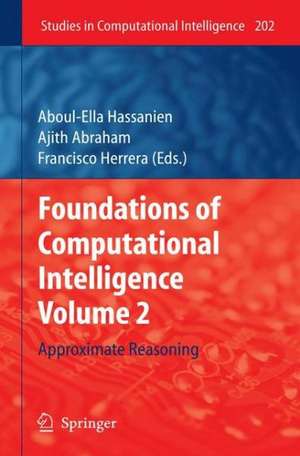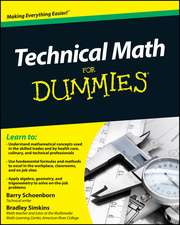Foundations of Computational Intelligence Volume 2: Approximate Reasoning: Studies in Computational Intelligence, cartea 202
Editat de Aboul-Ella Hassanien, Ajith Abraham, Francisco Herreraen Limba Engleză Hardback – 15 iun 2009
| Toate formatele și edițiile | Preț | Express |
|---|---|---|
| Paperback (1) | 945.79 lei 43-57 zile | |
| Springer Berlin, Heidelberg – 28 oct 2010 | 945.79 lei 43-57 zile | |
| Hardback (1) | 951.91 lei 43-57 zile | |
| Springer Berlin, Heidelberg – 15 iun 2009 | 951.91 lei 43-57 zile |
Din seria Studies in Computational Intelligence
- 20%
 Preț: 449.37 lei
Preț: 449.37 lei - 20%
 Preț: 1158.26 lei
Preț: 1158.26 lei - 20%
 Preț: 986.66 lei
Preț: 986.66 lei - 20%
 Preț: 1452.76 lei
Preț: 1452.76 lei - 20%
 Preț: 168.78 lei
Preț: 168.78 lei - 20%
 Preț: 1291.10 lei
Preț: 1291.10 lei - 18%
 Preț: 1112.30 lei
Preț: 1112.30 lei - 20%
 Preț: 565.39 lei
Preț: 565.39 lei - 20%
 Preț: 649.28 lei
Preț: 649.28 lei - 20%
 Preț: 1047.73 lei
Preț: 1047.73 lei - 20%
 Preț: 1578.96 lei
Preț: 1578.96 lei - 20%
 Preț: 643.50 lei
Preț: 643.50 lei - 20%
 Preț: 657.49 lei
Preț: 657.49 lei - 20%
 Preț: 993.28 lei
Preț: 993.28 lei - 20%
 Preț: 990.80 lei
Preț: 990.80 lei - 20%
 Preț: 989.96 lei
Preț: 989.96 lei - 20%
 Preț: 1165.69 lei
Preț: 1165.69 lei - 20%
 Preț: 1444.52 lei
Preț: 1444.52 lei - 20%
 Preț: 1041.96 lei
Preț: 1041.96 lei - 20%
 Preț: 1047.73 lei
Preț: 1047.73 lei - 20%
 Preț: 1046.06 lei
Preț: 1046.06 lei - 18%
 Preț: 2500.50 lei
Preț: 2500.50 lei - 20%
 Preț: 989.13 lei
Preț: 989.13 lei - 20%
 Preț: 1165.69 lei
Preț: 1165.69 lei - 20%
 Preț: 1164.05 lei
Preț: 1164.05 lei - 20%
 Preț: 1042.79 lei
Preț: 1042.79 lei - 20%
 Preț: 1460.19 lei
Preț: 1460.19 lei - 18%
 Preț: 1403.52 lei
Preț: 1403.52 lei - 18%
 Preț: 1124.92 lei
Preț: 1124.92 lei - 20%
 Preț: 1039.47 lei
Preț: 1039.47 lei - 20%
 Preț: 1008.11 lei
Preț: 1008.11 lei - 20%
 Preț: 1045.25 lei
Preț: 1045.25 lei - 20%
 Preț: 1275.42 lei
Preț: 1275.42 lei - 20%
 Preț: 1040.32 lei
Preț: 1040.32 lei - 20%
 Preț: 988.32 lei
Preț: 988.32 lei - 20%
 Preț: 1169.79 lei
Preț: 1169.79 lei - 20%
 Preț: 1162.37 lei
Preț: 1162.37 lei - 20%
 Preț: 1059.26 lei
Preț: 1059.26 lei - 20%
 Preț: 1164.05 lei
Preț: 1164.05 lei - 20%
 Preț: 1166.52 lei
Preț: 1166.52 lei - 20%
 Preț: 1459.38 lei
Preț: 1459.38 lei - 18%
 Preț: 1005.74 lei
Preț: 1005.74 lei - 20%
 Preț: 997.38 lei
Preț: 997.38 lei - 20%
 Preț: 1055.94 lei
Preț: 1055.94 lei - 20%
 Preț: 1284.47 lei
Preț: 1284.47 lei - 20%
 Preț: 994.08 lei
Preț: 994.08 lei - 20%
 Preț: 1048.72 lei
Preț: 1048.72 lei - 20%
 Preț: 1066.02 lei
Preț: 1066.02 lei - 20%
 Preț: 943.78 lei
Preț: 943.78 lei - 20%
 Preț: 1173.10 lei
Preț: 1173.10 lei
Preț: 951.91 lei
Preț vechi: 1160.86 lei
-18% Nou
Puncte Express: 1428
Preț estimativ în valută:
182.21€ • 197.98$ • 153.15£
182.21€ • 197.98$ • 153.15£
Carte tipărită la comandă
Livrare economică 21 aprilie-05 mai
Preluare comenzi: 021 569.72.76
Specificații
ISBN-13: 9783642015328
ISBN-10: 3642015328
Pagini: 324
Ilustrații: X, 312 p.
Dimensiuni: 155 x 235 x 25 mm
Greutate: 0.63 kg
Ediția:2009
Editura: Springer Berlin, Heidelberg
Colecția Springer
Seria Studies in Computational Intelligence
Locul publicării:Berlin, Heidelberg, Germany
ISBN-10: 3642015328
Pagini: 324
Ilustrații: X, 312 p.
Dimensiuni: 155 x 235 x 25 mm
Greutate: 0.63 kg
Ediția:2009
Editura: Springer Berlin, Heidelberg
Colecția Springer
Seria Studies in Computational Intelligence
Locul publicării:Berlin, Heidelberg, Germany
Public țintă
ResearchCuprins
Approximate Reasoning - Theoretical Foundations and Applications.- Fuzzy Sets, Near Sets, and Rough Sets for Your Computational Intelligence Toolbox.- Fuzzy without Fuzzy: Why Fuzzy-Related Aggregation Techniques Are Often Better Even in Situations without True Fuzziness.- Intermediate Degrees Are Needed for the World to Be Cognizable: Towards a New Justification for Fuzzy Logic Ideas.- Paraconsistent Annotated Logic Program Before-after EVALPSN and Its Application.- Approximate Reasoning - Success Stories and Real World Applications.- A Fuzzy Set Approach to Software Reliability Modeling.- Computational Methods for Investment Portfolio: The Use of Fuzzy Measures and Constraint Programming for Risk Management.- A Bayesian Solution to the Modifiable Areal Unit Problem.- Fuzzy Logic Control in Communication Networks.- Adaptation in Classification Systems.- Music Instrument Estimation in Polyphonic Sound Based on Short-Term Spectrum Match.- Ultrasound Biomicroscopy Glaucoma Images Analysis Based on Rough Set and Pulse Coupled Neural Network.- An Overview of Fuzzy C-Means Based Image Clustering Algorithms.
Textul de pe ultima copertă
Human reasoning usually is very approximate and involves various types of uncertainties. Approximate reasoning is the computational modelling of any part of the process used by humans to reason about natural phenomena or to solve real world problems. The scope of this book includes fuzzy sets, Dempster-Shafer theory, multi-valued logic, probability, random sets, and rough set, near set and hybrid intelligent systems. Besides research articles and expository papers on theory and algorithms of approximation reasoning, papers on numerical experiments and real world applications were also encouraged. This Volume comprises of 12 chapters including an overview chapter providing an up-to-date and state-of-the research on the applications of Computational Intelligence techniques for approximation reasoning. The Volume is divided into 2 parts: Part-I: Approximate Reasoning – Theoretical Foundations and Part-II: Approximate Reasoning – Success Stories and Real World Applications.
Caracteristici
Second volume of a Reference work on the foundations of Computational Intelligence Devoted to approximate reasoning










